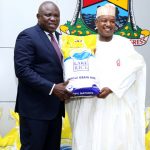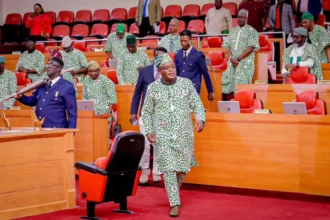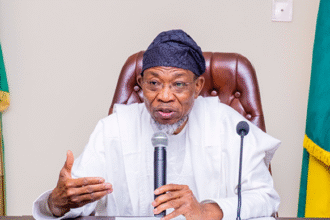...To get all news updates, Join our WhatsApp Group (Click Here)
Also Join our WhatsApp Channel (Click Here)
Smarting from the allegation of N26billion shady contract awards, the Nigerian National Petroleum Corporation (NNPC), is once again in the news for the wrong reason, this time for allowing some unregistered companies to lift crude valued at N1.1trillion ($3.5billion).
Minister of State for Petroleum Resources, Ibe Kachikwu, had a few months ago raised a lot of dust, when he revealed that the company, Nigeria’s cash cow, awarded contracts worth about N26billion without the approval of the board, as prescribed by law.
In a comprehensive report, which again questioned the integrity of the operations of the corporation in the regime of President Muhammadu Buhari, which has vowed to stamp out corruption from Nigeria, Daily Trust on Sunday, unearthed another dark side, this time in the mind-boggling oil lifting deal.
Read the report: Some indigenous companies not registered by the Corporate Affairs Commission (CAC) have lifted Nigerian crude oil grades valued at $3.5 billion (about N1.1 trillion) in the last 10 months, an investigation by Daily Trust on Sunday has shown.
A four-month enquiry into Nigerian and global corporate registries by our reporter showed that the repeated failure by the Nigerian National Petroleum Corporation (NNPC) to provide clear and accurate identity of some companies it awarded multi-million dollar oil lifting contracts this year is helping these companies to escape public scrutiny.
This is even as the corporation prepares for another round of award, as it had, in late October, issued a tender seeking companies to engage in the lifting of Nigerian crude oil grades for the 2018/2019 term.
The main problem started on January 3, 2017 when the NNPC announced 39 successful winners for its crude lifting contract that would run for 12 months. The announcement was followed by a release of the names of the winners to newsmen and in a post on its official website.
The names of the 18 beneficiary Nigerian companies were simply given as Prudent Energy; Setana Energy; Emo oil; Bono; Optima Energy; Shoreline Limited; AMG Petroenergy; A. A. Rano; Cassiva Energy and Arkleen Oil and Gas Limited. Others are North West Petroleum; Brittania-U; Hyde Energy; Eterna Oil and Gas; Masters Energy; MRS Oil and Gas; Sahara Energy and Oando.
Part of the mandatory pre-qualification requirement for the Nigerian companies that applied for the contract as requested by the NNPC was evidence of company registration issued by the CAC.
Daily Trust on Sunday wrote to the CAC seeking information on the registration statuses of the 18 indigenous companies that won the contract. But the commission replied that it had no evidence of the registration of seven of the 18 companies.
It listed AMG Petroenergy Limited, Brittania-U, Cassiva Energy, Hyde Energy, Masters Energy and Bono Energy Nigeria Limited as companies that didn’t exist on its database.
“If you have any document to support their registration, you may wish to forward them to us to enable us investigate further,” CAC’s reply dated September 26, 2017 and signed by Terver Ayua-Jor stated.
The name of the last company in the CAC response letter was misspelled as Savana Energy instead of Sahara Energy as requested by this newspaper.
“That shows that the company is not registered, the name does not exist,” said an Abuja-based lawyer with experience in companies’ registration.
“You cannot build something on nothing,” the lawyer, who did not want to be named, said about the legal implication of a company not being registered, adding that Section 30, subsection 1 (a) of the Companies and Allied Matters Act (CAMA) states that the CAC cannot register companies with identical names.
A Freedom of Information (FOI) request dated August 9, 2017 to the NNPC asking for the authentic names of the 18 indigenous companies as well as their crude oil entitlements, has not been replied by the corporation as at the time of filing this report.
Some top NNPC officials responsible for crude sales approached for confidential response to the discrepancies in the companies’ identities also did not respond for months.
The refusal to make information about the real identities of the companies available contradicts provisions of the Public Procurement Act, 2007, which is the legal framework for contract award and public procurement in Nigeria.
Section 38 (2) of the Act requires every procuring government entity to, on request, make available the comprehensive record of procurement proceedings to “(a) any person after a tender, proposal, offer or quotation has been accepted or after procurement proceedings have been terminated without resulting in a procurement contract.”
Independent analyses conducted through foreign corporate registration databases like open corporate, fara.gov and websites of the 18 indigenous companies showed that the NNPC may have deliberately fed the public with the incorrect legal names of entities to which it is entrusting billions of dollar worth of oil sales.
For instance, a web-based search for ‘Cassiva Energy,’ one of the companies given by the NNPC as oil lifting contract beneficiary, showed that no entity exists as ‘Cassiva Energy.’ Instead, Casiva Limited was found.
Casiva Limited announced on its website, NNPC’s 2017/2018 crude off take award to the company as one of the jobs it had executed.
Also, AMG Petroenergy, which the NNPC awarded the contract and the CAC said didn’t exist in its database, has a company website named as AMG Petroenergy Limited.
“AMG is very well established in Nigeria’s oil and gas downstream. Currently, AMG markets 90,000 barrels per day of crude oil in the international market from the NNPC,” the website stated about the company’s business objectives.
Daily Trust on Sunday wrote to AMG Petroenergy Limited through the main contact email address on its website, asking questions pertaining to the exact name it signed the NNPC contract with, its crude entitlements, as well as how it markets, transports or otherwise disposes of the crude cargoes it receives under its contract(s) with the commission, but the company did not reply.
Again, Brittania-U, one of the companies the CAC said didn’t exist in its database, has a website that announced the company as “a leader in Nigeria’s petroleum industry” and “a major player in the upstream and downstream sectors” operating in Nigeria for over 20 years as an indigenous integrated company.
“You can’t find Brittania-U Nigeria Limited? Please! Please!” Catherine Uju Ifejika, chairman/chief executive officer of the company responded in an irate tone when our reporter contacted her about why the company could not be found in the CAC record.
“I signed the contract (as Brittania-U Nigeria Limited). There is only one company that is Brittania-U Nigeria Limited,” Ifejika said after reminding our reporter of her 35-year experience as a lawyer and, therefore, couldn’t have made any mistake about the contract she signed.
“There is nobody in the industry that does not know Brittania-U as a group with almost seven companies in it,” she also added.
When she was told that the name emanated from the NNPC, Mrs Ifejika said, “It is not the NNPC, you people (journalists) are the ones that make up this state of confusion. Why would the NNPC give a company that is not in existence?’’
In response to a question on why the NNPC published her company’s name simply as Brittania-U, she said, “I don’t care what they (NNPC) have out (published). I didn’t even look at what they have out. I signed an agreement between myself, my company and the NNPC. The grand norm is the agreement.”
A web-based search of ‘Masters Energy,’ another company in the NNPC award list the CAC records showed didn’t exist, pulled Masters Energy Oil and Gas Ltd instead, as the closest semblance to the latter in Nigeria.
Masters Energy Oil and Gas Ltd, according to the information in its website, was incorporated in Nigeria in 2005 to “operate fully in the oil and gas sector.”
It is as a member of Masters Energy Group owned by a Nigerian oil magnate and politician, Mr. Uchechukwu Sampson Ogah, who, on June 27, 2016, was declared governor of Abia State by a Federal High Court in Abuja, but a Supreme Court judgement truncated his ambition.
Daily Trust on Sunday contacted the company’s spokesman, Emmanuel Iheanacho, on the name of the entity or subsidiary/sister company/companies the contract was directly awarded, including examples of cargoes of Nigerian crude that the company traded prior to signing the contract with the NNPC. Mr. Iheanacho acknowledged receipt of the questions but replied in a text: “I cannot respond from where I am. Thanks so much for your professional approach,” explaining earlier that he was “out of office for the next three to four weeks,” so he couldn’t reply.
Our reporter reached out to the other companies through an email address or phone numbers on the websites that matched their companies’ names, but they did not respond to either say they received or did not receive crude sales award from the NNPC in 2017.
The spokesman of the NNPC, Ndu Ughamadu, promised to address the questions raised in the August 9, 2017 FOI request, but response was still being awaited as at press time.
The NNPC, however, had in January 2017 replied a query on similar matter, stating that it made the “difficult choice” not to publish the winners’ full names in an effort to protect them and “gullible buyers” from fraudsters.
Crude market and industry professionals, however, disagreed, saying that in an oil market commonly marred by fraud and illegal sales, precision around company identities is important.
“I believe transparency is a major challenge in the Nigerian business environment. It should be easy to know who the traders and shippers are and their qualifications to undertake the tasks,” said Emeka Duruigbo, a professor of Energy and Business Law at Thurgood Marshall School of Law, Houston, Texas.
“Corruption, ineptitude and inefficiency thrive in the midst of opacity,” Duruigbo, who has knowledge of the workings of the international oil market said.
How dodgy companies pocket margins from $3.5bn oil
The crude term sale contracts to companies, including those awarded the 18 Nigerian oil companies, are among the most significant deals the NNPC signs yearly because crude sales are government’s largest revenue stream.
When in January 3, 2017, the corporation announced successful winners for the contract, it also stated that all the companies (excluding Duke Oil, NNPC subsidiary), were to receive 32,000 barrels per day (b/d) of the Nigerian equity crude.
Consequently, about 67.2 million barrels of Nigerian crude may have been lifted from January to October 2017 by AMG Petroenergy Limited, Brittania-U, Cassiva Energy, Hyde Energy, Masters Energy, Bono Energy Nigeria Limited and Sahara, which are the seven companies that were not found in the CAC database.
The 67.2 million barrels of oil was arrived at after multiplying 32,000 barrels daily lifting by the seven companies for 10 months.
The NNPC, in a November 27 statement, quoted its Group General Manager, Corporate Planning and Strategy, Mr. Bala Wunti, to have said that average crude oil price between January and October 2017 was $52.49 barrels per day.
Therefore, multiplying $52.49 by 67.2 million barrels crude shows that the value of oil lifted by the seven companies with identity problems may be worth as much as $3.5 billion in the market, or N1.1 trillion at the official exchange rate of N307 to a dollar.
The margins collected by these companies from the sales of the $3.5 billion worth of oil are mind-boggling if Daily Trust on Sunday’s calculation of the margins is anything to go by.
Market analysis shows that the NNPC sells the country’s crude share to the trading companies at a discounted price, when compared to Brent crude, the global crude benchmark.
Our reporter studied Argus and Platts, two of the leading global commodity markets price producers and found that the official selling price (OSP) the NNPC sets for Nigerian crude generally fluctuates, but they are often lower than a barrel of Brent crude, the benchmark for most of the oil produced in Africa.
Because some of these trading companies lack the financial and operational wherewithal to sell the oil, they instead resell or ‘flip,’ the oil they receive to larger, more experienced commodity traders and collect a margin on the sale.
According to findings by Daily Trust on Sunday, the standard margin traders rake in is about $0.3-0.4 per barrel, although the margin may vary considerably, depending on market conditions.
According to our estimates, each of the trading companies could be reaping as much as $3.8 million ($0.4 per barrel) margin monthly on a standard cargo load of 960,000 barrels (32,000 per day), depending on what it negotiated in the crude marketing agreement with the NNPC.
A 2012 House of Representatives committee audit, led by ex-lawmaker, Mr. Farouk Lawan, named some of these dodgy companies among oil marketers that collected subsidy funds from the Federal Government illegally. They were also listed as chronic tax defaulters to the government.
The Federal Inland Revenue Service (FIRS) relied on Section 14 (1) (d) of the FOI Act to decline a Daily Trust on Sunday’s request for information on the seven companies’ outstanding tax liabilities.
“A public institution must deny any application that contains information required of any taxpayer in connection with the assessment or collections of any tax…” Wahab Gbadamosi, head of communications of the FIRS said.
There is no available public record that the companies made refunds to the government, but the NNPC continues to award oil lifting contracts to them.
This investigation was supported by a grant from the Natural Resource Governance Institute (NRGI). The NRGI had no editorial control over the content.
You can get every of our news as soon as they drop on WhatsApp ...To get all news updates, Join our WhatsApp Group (Click Here)
Also Join our WhatsApp Channel (Click Here)











